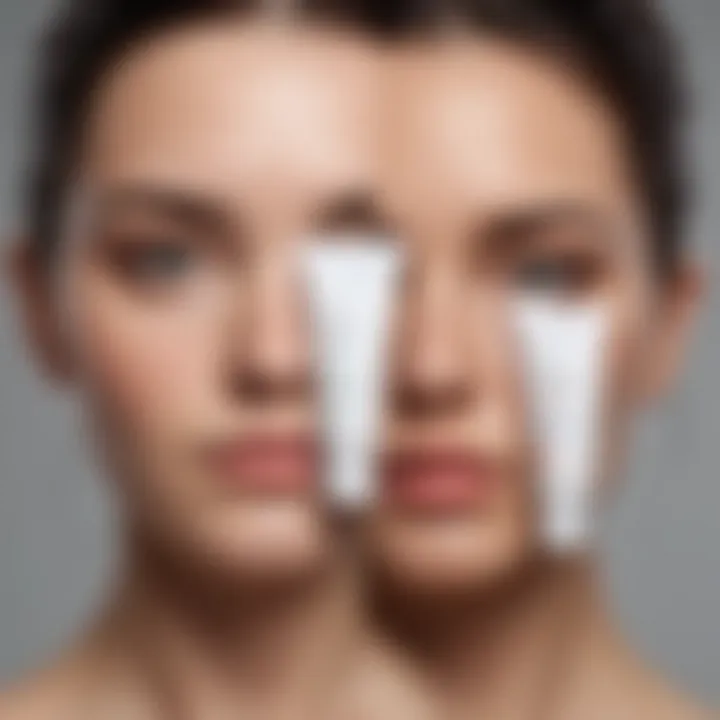Top Sunscreens for Acne-Prone Skin: Essential Picks


Intro
Navigating the world of skincare can be a bit like finding your way through a maze, especially when it comes to dealing with acne-prone skin. Different factors such as climate, hormonal changes, and lifestyle choices play into the challenges of choosing the right products. In today's age where self-care holds significant value, understanding how to integrate sun protection into the skincare regimen is essential. The relationship between sunscreen and acne may not always be straightforward; worrying about clogged pores can make individuals hesitant. This guide aims to clarify those concerns and shed light on the best sunscreens available, tailored specifically for those with acne-prone skin.
The goal here is to leave no stone unturned in helping readers understand the complexities of sunscreen selection—from the right ingredients to the best application techniques.
Key Trends
As skin health becomes an increasingly pivotal topic in beauty discussions, various trends have emerged that not only focus on aesthetics but also the wellness aspect of skincare. This section will explore the trends shaping today's beauty landscape—specifically emphasizing those that intersect with acne care.
Overview of Current Fashion Trends
In the realm of skincare, the trend toward gentle formulations has gained momentum. Consumers are gravitating towards products marked as "non-comedogenic". This term suggests that the product has been specifically designed to not block pores, which is paramount for those with acne-prone skin. Additionally, various brands now market oil-free sunscreens that offer a lightweight feel—ideal for daily use without the worry of exacerbating breakouts.
Popular Beauty Trends
Furthermore, a significant trend is the shift toward inclusive skincare. Brands are introducing a myriad of options to cater to diverse skin types and sensitivities. With ingredients like niacinamide and salicylic acid being more common in sunscreens, the appeal lies in their dual nature—serving both sun protection and acne management.
Beauty Tips and Tutorials
Skincare Routines for Different Skin Types
Establishing an effective skincare routine is not one-size-fits-all, and this is particularly true for acne-prone individuals. Incorporating a sunscreen into a routine isn’t merely about sun protection; it's about enhancing overall skin health. Here are some tips:
- Morning Routine: Cleanse with a gentle, non-abrasive cleanser. Follow it with a lightweight moisturizer that won’t clog pores, and finish off with a sunscreen tailored for oily or combination skin.
- Evening Routine: Start again with cleansing— a good rule of thumb is to double cleanse. Once your face is clean, apply a targeted treatment before following with a nourishing night cream, if needed.
Step-by-Step Makeup Tutorials
For those who wish to wear makeup, incorporating sunscreen seamlessly into makeup is crucial. Here’s a mini-guide to achieve this:
- Begin with a clean face.
- Apply a pea-sized amount of Arizona SunBlock, blending evenly.
- Let the sunscreen absorb for a few minutes.
- Apply a mineral-based foundation to avoid pore-clogging ingredients.
- Set with a light, non-comedogenic powder.
Sustainable Practices
Understanding Sustainable Beauty
Sustainability is not just a trend; it’s becoming a necessity. Many brands are moving toward eco-friendly practices, emphasizing not just the ingredients but the packaging as well. This means fewer harmful chemicals and more biodegradable materials in product lines.
Tips for Sustainable Beauty
- Choose Refillable Products: Opt for brands that offer refillable containers, reducing waste in the long run.
- Research Ingredients: Familiarize yourself with what you’re applying to your skin—choosing products that use natural, sustainably sourced ingredients is beneficial for both skin and environment.
Understanding Acne-Prone Skin
Understanding acne-prone skin is the cornerstone of any effective skincare regimen, particularly when it comes to choosing the right sunscreen. For many, the struggle with acne transcends mere skin issues; it can significantly impact confidence and overall well-being. This section dives into the biological elements that contribute to acne, the varied factors that exacerbate it, and the relevance of sunscreen for those battling this skin condition.
The Biology of Acne
Acne develops when hair follicles become clogged with oil and dead skin cells. The sebaceous glands, which produce oil, are key players in this process. When they produce excess oil, it can combine with dead skin, forming a plug. Once the follicles become clogged, it creates a breeding ground for bacteria known as Propionibacterium acnes. This bacterium thrives in this environment, leading to inflammation and the characteristic redness associated with acne. Moreover, hormonal fluctuations, particularly during puberty or menstruation, can heighten sebum production, further increasing the likelihood of breakouts. Understanding these biological mechanisms can highlight why specialized care is necessary for acne-prone skin, particularly in the choice of skincare products, including sunscreen.
Factors Contributing to Acne
While biological processes play a significant role in acne development, various external factors also contribute. Here are some key influences:
- Hormones: As mentioned earlier, fluctuations in hormone levels can trigger sebaceous glands to work overtime, producing excess oil.
- Diet: High glycemic foods and dairy products have been linked to increased acne prevalence. Reducing intake of these may help manage breakouts.
- Stress: When stress levels rise, so do hormones like cortisol, which can lead to increased oil production and subsequent breakouts.
- Environmental Factors: Pollution or exposure to certain chemicals can clog pores and irritate skin, exacerbating acne conditions.
- Skin Care Products: Certain products that are heavy or comedogenic can lead to clogged pores. It’s vital to choose non-comedogenic options, especially for those already prone to acne.
Employing this understanding can help individuals customize their skincare routines to address underlying issues that contribute to acne.


Why Sunscreen is Essential for Acne-Prone Skin
Sunscreen is not merely an option; it's a fundamental requirement for anyone with acne-prone skin. The reasons for this are manifold:
- Protection from UV Damage: Ultraviolet rays can aggravate existing acne and lead to hyperpigmentation, where dark spots remain long after the acne has resolved.
- Prevention of Post-Inflammatory Hyperpigmentation: This condition follows the resolution of inflammation. Sunscreen can significantly reduce the risk of dark spots developing on the skin after a breakout.
- Support for Overall Skin Health: Sunscreen shields the skin from other harmful environmental factors. This layer of protection assists in maintaining skin integrity and speeds up the healing process following acne lesions.
"Using sunscreen is not just about sun exposure; it’s about maintaining the balance in skin health and ensuring that healing is optimized while protecting against future damage."
The Importance of Sunscreen
Sunscreen is more than just a beach bag essential; it plays a crucial role in skincare, especially for those with acne-prone skin. Understanding its multiple functions goes beyond the realm of fashion advice; it is central to maintaining healthy skin and mitigating the potential for breakouts. For individuals grappling with acne issues, employing sunscreen can significantly improve skin quality by protecting it from harmful external factors. Below, we delve into the various facets of sunscreen's importance, particularly focusing on acne-prone skin.
Protecting Skin from UV Damage
The sun’s ultraviolet (UV) rays are not just a summer worry but a year-round threat to skin integrity. Prolonged exposure leads to oxidative stress, which can hinder skin healing processes. In simpler terms, these rays can exacerbate existing acne and complicate skin recovery after a breakout. When skin is already inflamed, UV exposure can worsen the situation by triggering more irritation and, consequently, more acne.
Using a broad-spectrum sunscreen is like putting on an invisible suit of armor against these damaging rays. Opting for non-comedogenic products ensures the sunscreen doesn’t contribute to clogged pores, which are a primary concern for those with acne-prone skin. The proper application ensures a layer of protection that can prevent not only burns but deeper cellular damage as well.
Preventing Post-Inflammatory Hyperpigmentation
For many, the aftermath of acne isn't just about the bumps; it's about the dark spots that can linger long after the acne itself has faded. This condition, known as post-inflammatory hyperpigmentation (PIH), occurs when skin heals and darkens due to inflammation. The sun's rays can amplify these dark spots, making them more pronounced and harder to treat.
By regularly applying sunscreen, individuals can significantly reduce the risk of PIH. The protective barrier helps maintain an even skin tone, preventing UV light from aggravating inflammatory marks. When applied daily, especially during breakout phases, sunscreen becomes a crucial ally in achieving clearer, more uniform skin.
Support for Overall Skin Health
Proper sunscreen application isn't just about avoiding sunburn; it’s about holistic skin health. Acne-prone skin has unique considerations, and managing these can be tricky. By using a daily sunscreen, individuals create a supportive environment for overall skin recovery.
Moreover, many modern sunscreens incorporate beneficial ingredients like antioxidants that can work in tandem with the skin's healing mechanisms. This helps reinforce skin vitality, enhancing hydration and allowing acne treatments to work more effectively.
”Daily sunscreen use might seem like a small step, but it can lead to significant improvements in skin health, especially for the acne-prone.”
Integrating sunscreen into daily routines is not merely an addition; it’s a commitment to healthier skin that can pay dividends in clarity and texture.
Key Ingredients to Seek
Choosing the right sunscreen for acne-prone skin goes far beyond simply picking a product that claims to be effective. The real battle lies in understanding the key ingredients that can make a tangible difference in your skincare routine. When seeking a sunscreen, it’s paramount to focus on non-comedogenic formulas, the type of sunscreen—whether mineral or chemical—and specific additives that have been proven to aid in managing acne-prone skin.
Non-Comedogenic Formulas
To begin with, non-comedogenic formulas are essential. This term refers to products that are specifically designed to not clog pores, thus preventing the formation of acne. Formulations that meet this criterion often utilize lighter oils or silicone-based ingredients that sit atop the skin rather than penetrating deep into the pores. For individuals grappling with acne, this is a game changer. A sunscreen that doesn’t contribute to breakouts can mean the difference between a good day or a breakout-filled one.
Mineral vs. Chemical Sunscreens
Next, a choice exists between mineral and chemical sunscreens. Mineral sunscreens contain active ingredients like zinc oxide or titanium dioxide, which act as physical blockers against UV rays. They often offer a more gentle alternative for sensitive skin, making them favorable for acne-prone individuals. On the other hand, chemical sunscreens absorb UV light through their chemical reactions. While they can be effective, some formulations may irritate sensitive skin or lead to flare-ups. Understand your skin's sensitivity before making a choice.
Additives that Benefit Acne-Prone Skin
Niacinamide
One additive to keenly consider is Niacinamide. This powerful ingredient serves multiple roles; it’s known for its anti-inflammatory properties and is great for calming redness, which many people with acne experience. One of its key characteristics is its ability to regulate oil production without drying out the skin. This balancing act makes Niacinamide a popular choice among those who are trying to manage their acne while keeping skin hydrated. However, while Niacinamide is generally well-tolerated, some people may experience minor irritation, but it is rarely problematic for most.
Zinc Oxide
Then we have Zinc Oxide. As a physical blocker, it doesn’t just shield your skin from the sun; it also carries anti-inflammatory properties that can soothe redness and irritation. Its strength lies in its ability to physically sit on the skin and deflect UV rays, making it incredibly effective for those prone to post-inflammatory pigmentation. A unique feature of Zinc Oxide is that it’s not just effective against UVA and UVB rays, but it also offers skin healing benefits. However, be mindful of the formulation, as certain products can leave a white cast on the skin, which might be unsightly for some.
Aloe Vera
Finally, let's highlight the benefits of Aloe Vera. This ingredient is not just known for its soothing and hydrating properties, but it also helps to heal and calm irritation caused by acne. Aloe Vera is often included in formulations to provide moisture without triggering breakouts, making it a beneficial component for acne-prone individuals. Its unique feature lies in its ability to be both hydrating and non-comedogenic, which is a win-win situation. However, individuals need to ensure they are using a formulation that contains real aloe over synthetic variants, which may not provide the same comfort.


Overall, being selective about the ingredients in your sunscreen can drastically improve how your skin reacts. Choosing the right formulation is not just about sun protection; it's about fostering an environment where your skin can thrive despite its underlying challenges.
Common Misconceptions about Sunscreen
The conversation around sunscreen often steers into murky waters with several myths clouding the essential role it plays, especially for those grappling with acne-prone skin. Understanding these misconceptions not only ensures better skincare practices but also empowers individuals to make informed choices. This section aims to clarify some widespread beliefs that commonly deter people from using sunscreen, despite its critical importance in any skincare regimen.
Will Sunscreen Clog Pores?
A prevalent concern among individuals with acne is the fear that sunscreen will clog their pores. This idea often stems from previous experiences with thicker, oil-based formulations that might have exacerbated their skin issues. However, not all sunscreens are created equal.
Many modern formulations are specifically designed to be non-comedogenic, meaning they won't block pores. Ingredients such as zinc oxide or titanium dioxide, commonly found in mineral sunscreens, tend to be gentler on the skin and less likely to provoke breakouts.
In fact, wearing sunscreen can actually help mitigate particular types of acne scarring by protecting the skin from UV rays that can worsen pigmentation issues. So, it's crucial to read labels and opt for those products that expressly state they are non-comedogenic to put your worries to rest.
Can Skip Sunscreen on Cloudy Days?
Another misunderstanding is the assumption that sunscreen is unnecessary on overcast days. While the sun might not be glaring, UV rays can penetrate through clouds and still pose a risk to the skin. Research suggests that up to 80% of UV rays can reach your skin even when it appears cloudy outside.
By skipping sunscreen on these days, those with acne-prone skin are particularly susceptible to potential sun damage and long-term complications like hyperpigmentation. In other words, it's wise to establish the habit of applying sunscreen daily, regardless of the weather. Keeping a broad-spectrum SPF handy can save lots of skin trouble down the line.
Only SPF Matters?
Many people believe that only the SPF rating should drive their sunscreen choices, leading them to pick the highest number available. However, SPF alone does not paint the full picture. While it does indicate the degree of protection against UVB rays, it fails to account for UVA rays, which can also contribute to skin damage and aging.
The key lies in looking for broad-spectrum sunscreens that guard against both UVB and UVA rays. Additionally, the effectiveness of sunscreen is influenced by factors such as adequate application amount and reapplication frequency. A higher SPF won't compensate for poor application techniques. So, the take-home message is: Don't get blinded by just the SPF number. Seeking complete protection is paramount for maximizing the benefits of daily sunscreen use.
Application Techniques for Optimal Results
When it comes to skincare, especially for those with acne-prone skin, even the best products won't do much good if they aren’t applied properly. The importance of application techniques cannot be overstated. How you apply sunscreen affects its effectiveness in preventing skin damage and promoting a clear complexion. Understanding these techniques ensures that you get the most out of your sunscreen, putting your best face forward amidst the daily challenges of acne.
How Much to Apply
Applying the right amount of sunscreen is like seasoning food; too little leaves it bland, and too much can overwhelm the dish. As a rule of thumb, aim for about a nickel-sized amount for your face alone. This amount provides adequate coverage to safeguard your skin from harmful UV rays. For a more precise approach, consider using about 2 milliliters for full facial protection. It’s important to ensure even coverage, so dabbing small dots in various areas—forehead, cheeks, nose, and chin—can help distribute the product evenly.
Be mindful that if you’re using a physical sunscreen, you might need slightly more to achieve protection than when using a chemical one. Remember, consistency is key. Applying your sunscreen in the morning can set a good pace for the day ahead, but do factor in your skin type. Oily skin may need a lighter application than dry skin.
Layering with Other Skincare Products
The order in which you layer your skincare products is critical to achieving optimal results. Typically, the rule of thumb is to apply products from thinnest to thickest. Start with your cleanser, followed by toners, serums, and then finish with your sunscreen.
You might be tempted to mix sunscreen with your moisturizer or foundation, but it can dilute its efficacy. Instead, apply sunscreen as the final step of your routine. If you’re using acne treatment products, such as retinoids or benzoyl peroxide, be sure to wait a few minutes after applying them before layering on sunscreen. This waiting time allows each product to settle in and work its magic before you layer another one on top.
Reapplication Best Practices
Reapplication of sunscreen is crucial, but it’s often overlooked. Ideally, you should reapply every two hours, especially if you’re sweating or spending prolonged periods outdoors. For those who lead busy lives or work in settings where it’s tough to refresh your sunscreen, consider carrying a powder sunscreen or a setting spray with SPF in your bag. These innovative products make reapplication a breeze, allowing you to maintain that protective barrier without disturbing your makeup.
One useful tip is to set an alarm or reminder on your phone to prompt you for reapplication. If you're at the beach or involved in outdoor activities, reapplying every hour is wiser. And don't forget to be generous with application; a light mist or powder isn't going to cut it when it comes to reapplication.
"A habit of applying and reapplying sunscreen can make all the difference in preventing breakouts triggered by sun exposure."
In summary, mastering these application techniques—how much to use, layering properly, and reapplying as needed—are fundamental steps in your skincare routine. Particularly for those battling acne, ensuring sunscreen provides proper skin protection while embracing a routine that supports your unique needs is the way to pave the path to healthier skin.
Best Sunscreens for Acne-Prone Skin: A Comparative Review
When navigating the landscape of sunscreens specifically designed for acne-prone skin, it’s key to weigh your options carefully. With various products out there, knowing which ones can seamlessly protect your skin while not triggering breakouts can feel like searching for a needle in a haystack. The goal here is to analyze different categories of sunscreens—from budget-friendly all the way up to premium recommendations—and explore their attributes, strengths, and drawbacks. By doing so, we empower you to make informed choices tailored to your skin’s needs.
Budget-Friendly Options
There’s no denying that skincare can get pricey, often leaving those of us on a budget feeling a tad defeated. However, high-quality sunscreens that cater to acne-prone skin are available without breaking the bank. Here are a few worthy contenders:


- Neutrogena Hydro Boost Water Gel Lotion SPF 30: This lightweight gel formula is infused with hydrating ingredients like hyaluronic acid, which helps retain moisture without clogging pores. It absorbs quickly, making it a fantastic choice for daily wear.
- CeraVe Hydrating Mineral Sunscreen SPF 30: This product combines mineral protection with ceramides, offering both sun safety and skin barrier support. Non-comedogenic and fragrance-free, it's a winner for sensitive, acne-prone skin.
"Finding an affordable sunscreen doesn't mean compromising on quality. Budget brands can still be effective and gentle."
Mid-Range Selections
Sometimes, you might be willing to spend a little more for added benefits and skin-loving ingredients. Mid-range products often strike a balance between efficacy and affordability. Here are some options worth considering:
- EltaMD UV Clear Broad-Spectrum SPF 46: This sunscreen is beloved among dermatologists, thanks to its lightweight formula that includes niacinamide, known for its anti-inflammatory properties. Perfect for those dealing with acne and rosacea, this sunscreen provides essential protection without feeling heavy.
- La Roche-Posay Anthelios Clear Skin Oil-Free Sunscreen SPF 60: This great option promotes oil control and is formulated specifically for acne-prone skin. The matte finish and high SPF help ensure you don’t end the day with a shiny face.
Premium Recommendations
If you’re in the market for top-tier formulations where every ingredient is mindfully chosen, premium options might catch your interest. You'll often find they offer luxurious textures and advanced protection:
- SkinCeuticals Physical Fusion UV Defense SPF 50: This tinted sunscreen feels weightless on the skin and provides mineral-based broad-spectrum protection. Its slight tint serves to reduce the appearance of redness, a plus for acne-prone complexions.
- Dr. Dennis Gross Skincare Mineral Sunscreen SPF 30: Combining sunscreen with skincare ingredients like aloe and vitamin E, this formula hydrates and protects simultaneously. It’s designed not only to shield from UV rays but also to nourish skin without clogging pores.
In looking at these diverse selections, it becomes apparent that topping off your skincare regimen with sunscreen is neither a luxury nor a mere afterthought—it’s a necessity. These options cater to various preferences, ensuring everyone can find something that works for them. By understanding the differences in formulation and performance, it paves the way for healthier, happier skin.
User Experiences and Testimonials
User experiences and testimonials play a crucial role in the discourse surrounding skincare products, particularly when it comes to sunscreens tailored for acne-prone skin. They serve as a bridge between product theory and real-world application, showcasing how different individuals navigate their unique skin challenges. Insights gleaned from these real-life accounts can help prospective users make informed decisions, benefiting not only their skin but also their overall confidence.
Real-Life Success Stories
Many individuals have found sunscreens that work wonders for their skin dilemmas. Take Sarah, who struggled with persistent breakouts for years. After switching to a sunscreen with zinc oxide as the key ingredient, she noticed a significant reduction in acne flare-ups. "It’s like I found the magic potion! My skin feels protected and the acne is less aggressive," Sarah shared. This sentiment echoes among others who have found solace in products that serve dual purposes: sun protection and soothing the skin without aggravating it.
Moreover, online communities, such as reddit.com, are treasure troves of user experiences. These stories not only highlight particular brands but also shed light on the personal journeys of people seeking balance in their skincare routines. The insights from diverse individuals can illuminate trends and patterns, helping others identify what might work for them as they navigate through their own skin care challenges.
Challenges Faced
However, while some experiences are positive, it's important to acknowledge the hurdles faced by many. For instance, Jessica found that even labeled non-comedogenic products sometimes led to unexpected breakouts. "It’s frustrating because what is marketed as acne-friendly doesn’t always deliver," she lamented. Another struggle is the feeling of heaviness some sunscreens impart, which can be particularly unsettling for those already dealing with oily or sensitive skin.
Moreover, the sheer variety of products can be overwhelming. Not every sunscreen caters to every individual's needs—what worked for one person may cause irritation for another, as Emily learned. "I bought a recommendation from an influencer and it broke me out after just a week. Now I'm back to square one, searching again!" Her story exemplifies the need for nuance in approaching skincare, as various factors like skin types and environmental effects play into how a product performs.
Lessons Learned
From these shared stories, several lessons emerge. First and foremost, it is essential to do one’s homework before trying out a new sunscreen. Thoroughly researching ingredients and potential reactions can save individuals from disappointing experiences. Many testimonials emphasize patch-testing new products before diving into regular use.
Additionally, many users recommend keeping an open dialogue with dermatologists or skincare specialists. Their professional insights can guide one’s choices, helping narrow down products that suit specific skin types and challenges. It’s all about finding the right fit, and not every product will be a one-size-fits-all solution.
Finally, the importance of patience cannot be overstated. Often, people expect immediate results, which can lead to frustration. Many users remark that it took time to see significant improvements—patience and consistency are key elements to successful skincare regimes.
"Listening to my skin and being patient was the biggest turnaround in my journey. The right sunscreen means more than just UV protection; it’s about understanding what works for you." — A common sentiment shared among users.
In sum, user experiences and testimonials not only enrich this discussion but also provide a roadmap for navigating the complexities of skincare for acne-prone skin. They illustrate real challenges and celebrate victories, all contributing to a deeper understanding of how the right sunscreen can make a world of difference.
Ending
In summarizing the discussion on sunscreens specifically designed for acne-prone skin, it becomes apparent just how vital proper sunscreen use is in every skincare regimen. Sunscreen serves not only as a barrier against harmful ultraviolet rays but also plays a fundamental role in promoting overall skin health, especially for individuals already struggling with acne.
Summarizing the Importance of Proper Sunscreen Use
Sunscreen is often underestimated in its ability to aid those with acne-prone skin.
- Protection from UV Damage: Prolonged exposure to sun can exacerbate skin conditions or lead to premature aging. A quality sunscreen provides peace of mind, safeguarding the skin from these aggressive sun rays.
- Combatting Hyperpigmentation: For those who experience post-inflammatory hyperpigmentation, sunscreen becomes non-negotiable. UV exposure darkens scars left by acne, making them more noticeable. Wearing sunscreen diligently can prevent this, promoting an even skin tone over time.
- Supports Healing: The skin's healing process can be hindered by sun damage. Sunscreen helps facilitate recovery by providing a protective layer that aids in the body's natural repair mechanisms.
"Without proper protection, our skin can suffer not just momentarily, but can leave lasting impacts that are much harder to resolve later on."
With these points in mind, it is obvious that daily sunscreen application is not just a suggestion but a critical component of managing acne-prone skin effectively.
Encouragement for Continued Skin Care Education
Merely understanding sunscreen's significance is just the tip of the iceberg. It’s imperative to engage in ongoing education about skincare essentials.
- Stay Informed: The world of skincare is always evolving; new research, products, and techniques surface occasionally. Staying updated can empower consumers to make educated decisions that fit their unique skin needs.
- Experiment: Each individual’s skin reacts differently. What works miracles for one might not do much for another. Encourage trial and error with different products that include beneficial ingredients aligned with personal skin concerns.
- Seek Professional Advice: Connecting with dermatologists or skincare professionals can provide tailored guidance and advice on the best products and routines.



